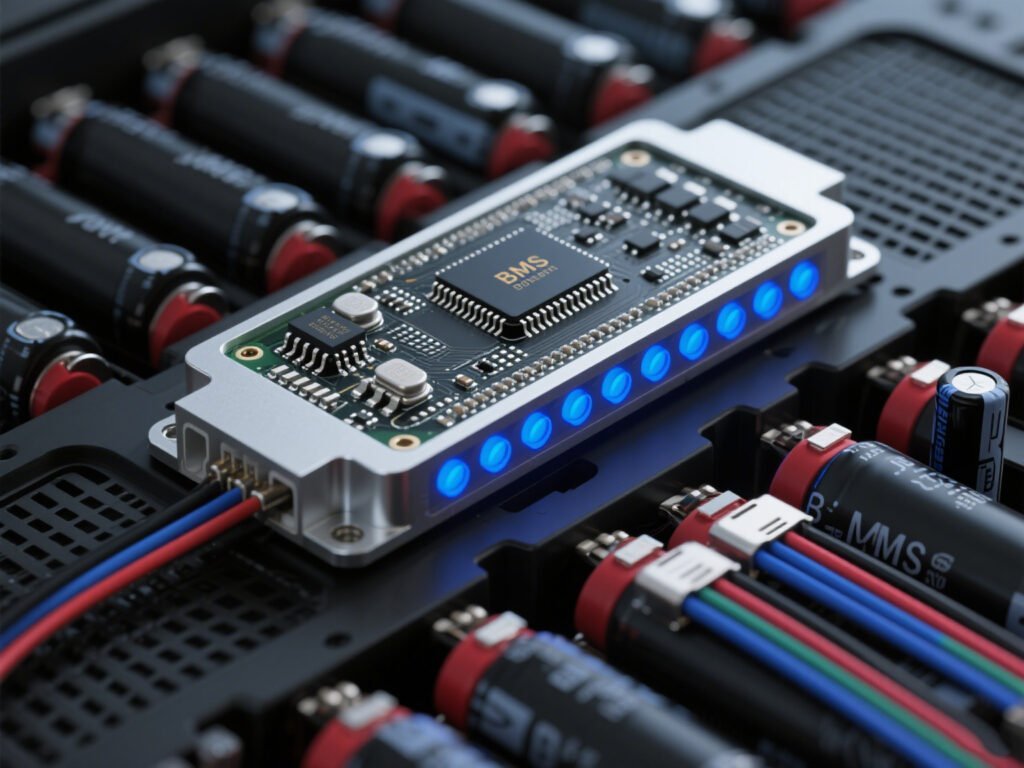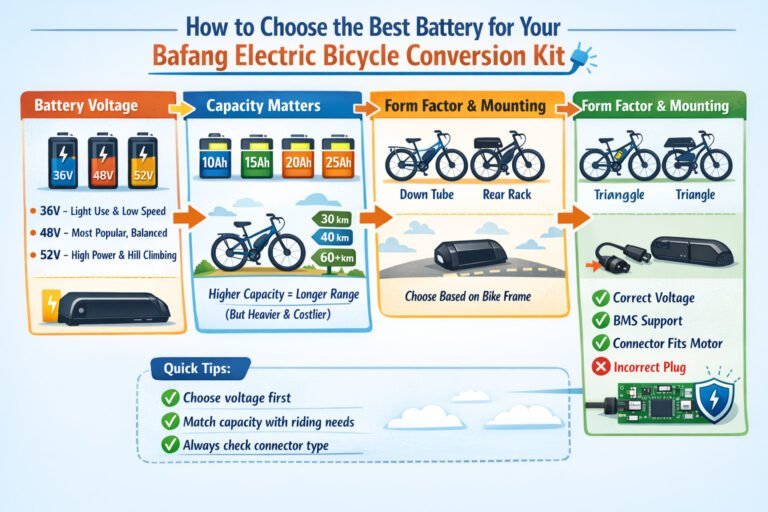In den schnell wachsenden Sektoren der Elektromobilität und der erneuerbaren Energien macht die Lithiumbatterietechnologie weiterhin rasante Fortschritte. Die hohe Energiedichte und die komplexe Elektrochemie bringen jedoch sowohl Leistungs- als auch Sicherheitsherausforderungen mit sich. An dieser Stelle kommt das Batteriemanagementsystem (BMS) ins Spiel. Wenn wir von einer BMS-Batterie sprechen, meinen wir einen Batteriesatz, der mit einem intelligenten System zur Überwachung, zum Schutz und zur Optimierung seiner Leistung ausgestattet ist.
In diesem Artikel erfahren Sie, was eine BMS-Batterie ist, wie sie funktioniert, welche Funktionen sie hat, welche Arten von BMS es gibt und warum BMS-Batterien für moderne Anwendungen wie E-Bikes, Elektro- und Solarenergiespeichersysteme sowie für die industrielle Automatisierung so wichtig sind.

Was ist eine BMS-Batterie?
Eine BMS-Batterie ist ein Lithium-Batterie-Pack mit integriertem Batterie-Management-System - ein intelligentes elektronisches System, das den Batteriebetrieb überwacht, um Sicherheit, Leistung und Langlebigkeit zu gewährleisten.
Ein BMS fungiert im Wesentlichen als das Gehirn der Batterie. Es sammelt und verarbeitet kontinuierlich Daten wie z. B.:
Spannung der einzelnen Zellen
Temperatur
Ladezustand (State of Charge, SOC)
Stromfluss
Status des Zellenausgleichs
Fehlersuche
Auf der Grundlage dieser Daten steuert das BMS die Lade-/Entladezyklen, kommuniziert mit externen Systemen (z. B. Fahrzeugsteuergeräten oder Wechselrichtern) und löst beim Auftreten anormaler Bedingungen Schutzmaßnahmen aus.
Warum ist BMS für Lithiumbatterien wichtig?
Im Gegensatz zu herkömmlichen Blei-Säure-Batterien sind Lithium-Ionen-Batterien empfindlicher gegenüber:
Überladung - die zu Überhitzung, Anschwellen oder sogar Feuer führen kann
Überentladung, die den Akku dauerhaft beschädigen kann
Thermischer Durchschlag - wenn hohe Temperaturen interne Kurzschlüsse auslösen
Ungleichgewicht der Zellen - verursacht ungleichmäßigen Verschleiß und verkürzte Lebensdauer der Batterie
Ein BMS sorgt dafür, dass jede einzelne Zelle innerhalb des Akkus innerhalb sicherer Parameter arbeitet. Ohne ein BMS könnten Lithiumbatterien unzuverlässig oder gefährlich werden, insbesondere bei Anwendungen mit hohem Drain oder hohen Temperaturen.
Hauptfunktionen eines Batteriemanagementsystems
Spannungsüberwachung
Das BMS überwacht die Spannung jeder einzelnen Zelle und die Gesamtspannung des Akkus. Wenn eine Zelle während des Ladevorgangs die sichere Spannungsschwelle überschreitet oder während des Entladevorgangs zu weit abfällt, unterbricht das BMS den Vorgang, um Schäden zu vermeiden.
Überwachung der Temperatur
Thermische Sensoren messen die Innen- und Außentemperatur der Batterie. Wenn die Temperatur Grenzwerte überschreitet, kann das BMS den Ladevorgang verlangsamen oder die Batterie abschalten, um eine Überhitzung zu vermeiden.
Stromüberwachung und Kurzschlussschutz
Durch ständige Stromüberwachung schützt das BMS vor:
- Überstrombedingungen
- Kurzschlüsse
- Umgekehrte Polarität
Dies ist bei Anwendungen mit hoher Belastung wie Elektrofahrrädern oder Elektrowerkzeugen entscheidend.
Schätzung des Ladezustands (SOC)
Das BMS berechnet die verbleibende Ladung der Batterie (wie eine Tankanzeige für Ihre Batterie). Dazu verwendet es Algorithmen wie Coulomb-Zählung und spannungsbasierte Schätzung.
Analyse des Gesundheitszustands (SOH)
Das BMS verfolgt die Degradation im Laufe der Zeit und bietet dem Benutzer einen Einblick in die Lebenserwartung und das Leistungsniveau der Batterie.
Zellausgleich
Lithiumzellen können mit der Zeit aus dem Gleichgewicht geraten. Das BMS verteilt die Energie aktiv zwischen den Zellen, um eine gleichmäßige Spannung zu gewährleisten und die Langlebigkeit und Kapazität zu verbessern.
Kommunikationsschnittstelle
Moderne BMS-Systeme verfügen über CAN-Bus-, UART-, RS485-, SMBus- oder I²C-Protokolle zur Kommunikation mit externen Systemen wie:
- Steuergeräte für Elektrofahrräder
- Solar-Wechselrichter
- Energiemanagementsysteme (EMS)
- Fahrzeug-ECUs
Arten von BMS-Systemen
BMS-Systeme gibt es in verschiedenen Architekturen:
- Zentrales BMS
Alle Funktionen und Sensoren sind auf einer einzigen Steuerplatine untergebracht. Dies ist bei kleinen bis mittleren Akkupacks wie eBikes oder USV-Anlagen üblich.
- Verteiltes BMS
Jede Zelle oder jedes Modul verfügt über eine eigene kleine Überwachungseinheit. Diese Einheiten senden Daten an einen Master-Controller. Geeignet für groß angelegte Systeme wie EVs oder Solaranlagen.
- Modulares BMS
Ein hybrider Ansatz, der eine zentrale Steuerung mit einem modularen Zellenmanagement kombiniert. Er bietet Flexibilität für mittlere bis große Anwendungen.
Anwendungen von BMS-Batterien
✅ Elektrische Fahrräder (eBikes)
Ein zuverlässiges BMS sorgt für sicheres Laden, konstante Leistungsabgabe und Echtzeitkommunikation mit dem eBike-Steuergerät. Moderne BMS-Systeme unterstützen auch Bluetooth für App-basierte Diagnosen.
✅ Elektromobilität
In der Elektromobilität steuert das BMS Tausende von Einzelzellen und sorgt für gleichbleibende Leistung, Sicherheit und Integration mit regenerativen Brems- und Antriebssystemen.
✅ Energiespeichersysteme (ESS)
Für Solar- und Windspeicher verwaltet das BMS große Lithium-Batteriebänke und sorgt für Stabilität bei schwankenden Lasten und erneuerbaren Energien.
✅ Unterbrechungsfreie Stromversorgungen (USV)
Eine mit einem BMS ausgestattete Batterie schützt unternehmenskritische Geräte, indem sie einen reibungslosen und sicheren Stromversorgungsbetrieb gewährleistet.
✅ Robotik und AGVs
Industrieroboter und fahrerlose Transportsysteme (AGVs) sind auf leistungsstarke Lithium-Akkus mit robuster BMS-Steuerung angewiesen, um Präzision, Sicherheit und eine lange Lebensdauer zu gewährleisten.
Was macht eine hochqualitative BMS-Batterie aus?
Nicht alle BMS-Batterien sind gleich. Zu den wichtigsten Merkmalen einer zuverlässigen BMS-Batterie gehören:
- Genaue SOC/SOH-Schätzung
- Hochgeschwindigkeits-Kommunikationsprotokolle (CAN/UART)
- Robuster Wärme- und Stromschutz
- Intelligente Fehlererkennung und -protokollierung
- Wasserdichtes oder widerstandsfähiges Gehäuse (IP65/IP67)
- Einhaltung von Zertifizierungen (UN38.3, CE, EN 50604, usw.)
BMS-Batterie-Trends im Jahr 2025
Die Batterieindustrie entwickelt sich weiter. Zu den aufkommenden BMS-Batterietrends gehören:
KI-gestütztes BMS für prädiktive Diagnostik
Cloud-vernetztes BMS für Fernüberwachung und Flottenmanagement
Intelligentes BMS mit Bluetooth oder mobiler App-Konnektivität
Sicherheitsstandards für die Automobilindustrie (ISO 26262)
Integration mit Schnellladesystemen (CCS, GB/T)
Eine BMS-Batterie ist mehr als nur ein Lithium-Pack - sie ist eine intelligente, sich selbst schützende und leistungsstarke Energielösung. Ganz gleich, ob Sie ein Elektrofahrrad mit Strom versorgen, ein Solarenergiesystem betreiben oder autonome Roboter bauen, die Integration eines zuverlässigen Batteriemanagementsystems ist unerlässlich, um Effizienz, Sicherheit und Lebensdauer zu maximieren.
Mit der Weiterentwicklung der Lithiumbatterietechnologie wird die Rolle des BMS immer wichtiger. Die Wahl einer Batterie mit einem robusten und intelligenten BMS ist nicht nur eine Frage der Leistung, sondern auch eine Frage des Vertrauens.






